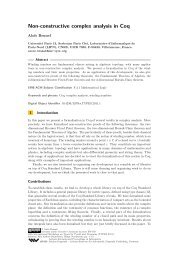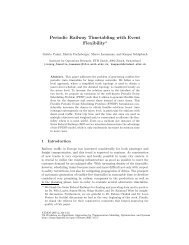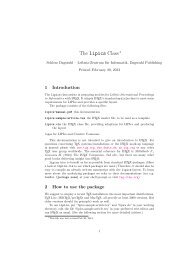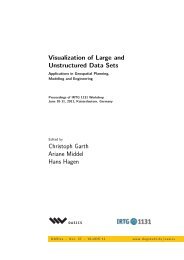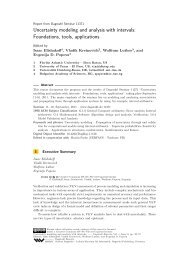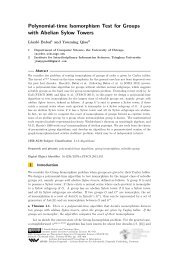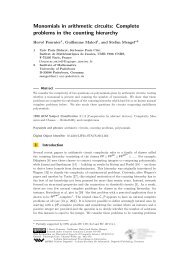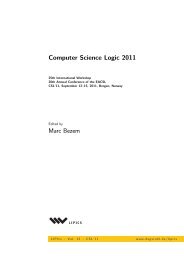Volume 1, Issue 1, January 2011 - DROPS - Schloss Dagstuhl
Volume 1, Issue 1, January 2011 - DROPS - Schloss Dagstuhl
Volume 1, Issue 1, January 2011 - DROPS - Schloss Dagstuhl
You also want an ePaper? Increase the reach of your titles
YUMPU automatically turns print PDFs into web optimized ePapers that Google loves.
Sven Apel, William Cook, Krzysztof Czarnecki, and Oscar Nierstrasz 35<br />
3.8 Re-Thinking Product Line Verification as a Constraints Problem<br />
Kathi Fisler (Worcester Polytechnic Institute, US)<br />
License Creative Commons BY-NC-ND 3.0 Unported license<br />
© Kathi Fisler<br />
Main reference Colin Blundell, Kathi Fisler, Shriram Krishnamurthi, Pascal Van Hentenryck, “Parameterized<br />
Interfaces for Open System Verification of Product Lines,” pp. 258–267, Proceedings of the 19th<br />
IEEE International Conference on Automated Software Engineering, 2004.<br />
URL http://dx.doi.org/10.1109/ASE.2004.53<br />
Software product-lines view systems as compositions of features. Each component corresponds<br />
to an individual feature, and a composition of features yields a product. Feature-oriented<br />
verification must be able to analyze individual features and to compose the results into<br />
results on products. Since features interact through shared data, verifying individual features<br />
entails open system verification concerns. To verify temporal properties, features must be<br />
open to both propositional and temporal information from the remainder of the composed<br />
product. This talk argues that we can handle both forms of openness by viewing product-line<br />
verification as a two-phase process of constraint generation and discharge, rather than as a<br />
conventional verification problem.<br />
3.9 Type Checking entire Product Lines<br />
Christian Kästner (Universität Marburg, DE)<br />
License Creative Commons BY-NC-ND 3.0 Unported license<br />
© Christian Kästner<br />
Joint work of Kästner, Christian; Apel, Sven<br />
I propose to give a very brief (6-10 minute) overview of concept of checking the product line<br />
instead of checking the derived products and how this can be applied to type systems. The<br />
idea is to highlight a common research trend and stipulate discussions about adopting all<br />
kinds of checks to check the entire product line.<br />
In a nutshell, the idea of a variability-aware type system to check the product-line<br />
implementation containing all variability (before product derivation) instead of checking<br />
each (of potentially billions of) derived product in isolation. Although the number of<br />
potential products may be exponential, variability-aware type systems exploit knowledge<br />
about variability implementation and can separate intrinsic complexity from accidental<br />
complexity. We are currently trying to scale such type system to type check the Linux<br />
kernel with over 8000 features. We believe that moving analysis from derived products to<br />
the product-line implementation is a common theme that can and should also be applied to<br />
many other approaches.<br />
1 1 0 2 1



